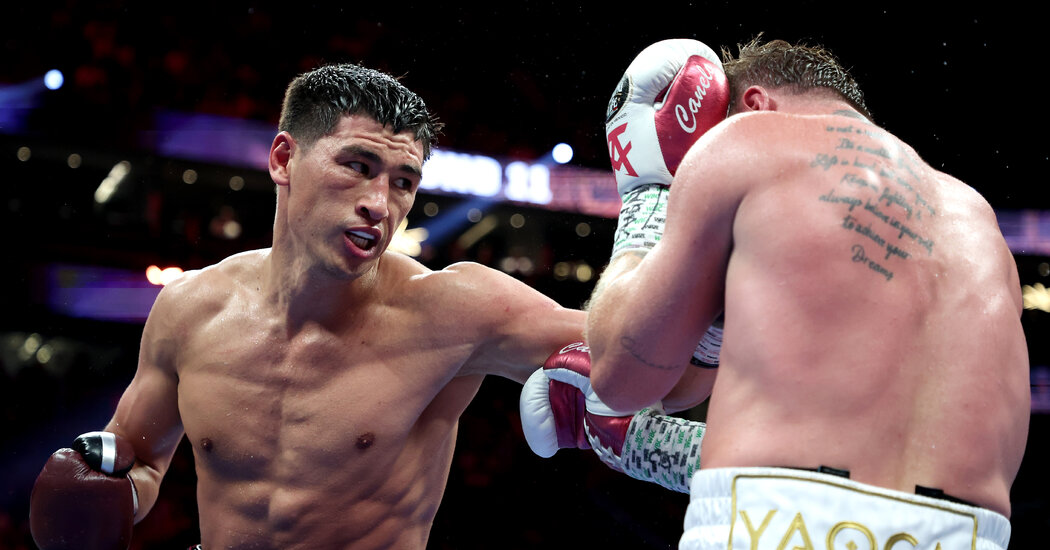
LAS VEGAS — In the closing moments of the final round of the light-heavyweight title fight between Saúl Álvarez and Dmitry Bivol, a ringside official banged a wooden clapper to signal that only 10 seconds remained in the bout.
Álvarez, known as Canelo, retreated, exhausted after 12 bruising rounds against a bigger opponent.
Bivol, the World Boxing Association champion and a heavy betting underdog, moved forward, hands high,
One of Bivol’s cornermen clenched his fists, raised his hands and waited for the final bell, convinced his fighter, who had weathered Álvarez’s power and responded with authoritative punches all night, had done plenty to earn a victory.
The judges agreed with team Bivol.
All three scored the bout 115-113 in favor of Bivol, a Russian who now lives in California, awarding him a decision both closely-contested and convincing.
While Bivol entered as an undefeated champion at 175 pounds, and faced a fighter in Álvarez who had moved up from a lighter weight class, his win qualifies as an upset. Streaming service DAZN had invested heavily in a two-fight deal with Álvarez, using his fights to launch its new pay-per-view program, selling bouts on top of a subscription service. DAZN had hoped the agreement would culminate in a September showdown between Álvarez and Gennadiy Golovkin, a middleweight champion who has fought Álvarez twice.
But Bivol’s win opens other possibilities, including a rematch with Álvarez.
“Thank you to Eddie Hearn,” Bivol said in the ring afterward, referring to the head of Matchroom Sport, which partners with DAZN on boxing programming. “Sorry I broke your plans with Gennadiy Golovkin.”
Bivol’s win improved his record to 20-0, and will force several stakeholders to adjust their plans.
Álvarez, who is the undisputed super-middleweight champion, but who entered Saturday’s light heavyweight title bout as the challenger, was guaranteed $15 million to fight Bivol. That figure is less than half of the $40 million he received up front for defeating Caleb Plant last November, even though Bivol figured to present a much tougher assignment for Álvarez.
At 6-feet, Bivol was among the tallest opponents Álvarez had ever faced, the same height as Sergey Kovalev, whom Álvarez trailed on the judges scorecards before winning by knockout in November 2019.
But the 31-year-old Bivol is a better tactical boxer than Kovalev, sturdy with a strong jab and sharp timing. He entered Saturday with a 19-0 record and victories over both strong punchers, like Joe Smith Jr., and patient boxers, like Lenin Castillo.
And he solved Álvarez by controlling the middle of the ring, forcing the challenger backward at times and standing up under Álvarez’s withering power.
In Round 7, Álvarez pounded Bivol’s shoulder with a right hand, and followed up with a left hook. Bivol responded with a flurry of lefts and rights, which disrupted Álvarez’s rhythm even if they didn’t land.
Álvarez appeared to win Round 9 by pressing forward, digging a right hand to Bivol’s rib cage, and connecting with a roundhouse right to the head. Bivol responded in Round 10, spearing Álvarez’s body with a long left jab, and landing a short right late in the round.
Between rounds, Álvarez’s chest heaved with heavy breathing. Bivol, also tiring but less visibility winded, calmly took instructions from his cornermen.
In the end all three judges awarded Bivol seven of the 12 rounds. Álvarez, who is now 57-2-2, said he plans to invoke the rematch clause in his contract, but did not complain about the scorecards.
“He’s a great champion,” said Álvarez, a native of Guadalajara, Mexico. “That’s how boxing is. I have to accept it.”
The relatively small guarantee for Álvarez also signaled that DAZN, the streaming service broadcasting the bout, and Matchroom, the promotional outfit that organized the event, expected robust pay-per-view sales, which would in turn, bolster Álvarez’s payday.
Consumer interest in the event was difficult to gauge beforehand.
Images of Álvarez and Bivol plastered the Las Vegas Strip in the days preceding the bout, the sidewalks dotted with vendors hawking fight merchandise — T-shirts, Álvarez headbands, miniature boxing gloves in the colors of the Mexican flag. For Friday afternoon’s weigh-ins, a crowd of boxing fans, most of them Álvarez partisans, packed the plaza outside T-Mobile Arena.
But the crowd inside the building Saturday night did not threaten the venue’s attendance record — 20,062 for an Ultimate Fighting Championship fight between Conor McGregor and Dustin Poirier in July 2021. The audience yawned through much of the undercard, whistling in derision as Montana Love won a decision over Gabriel Gollaz in the co-main event. At times they were so quiet, helicopters could be heard flying over the arena’s roof.
The loudest ovation on the undercard came when Álvarez arrived at the arena, sporting a bright pink tracksuit with a silver zipper and drawstrings, with Álvarez’s initials stenciled onto one side, and a Dolce & Gabbana logo on the other.
By 8:30 p.m., when the first of Bivol’s cornermen entered the ring to wait for their fighter, two sections in the arena’s lower bowl sported patches of vacant seats, which filled in within minutes. When the ring announcer, David Diamante, took the microphone and strode to the ring, the upper deck was still only half full.
They got something unusual on Saturday night: a spectacle of Álvarez being truly challenged rather than the sport’s biggest star putting on his usual dominant show. And Bivol, with his victory, became the first man in a long time to make Álvarez rethink his methodical plans.
